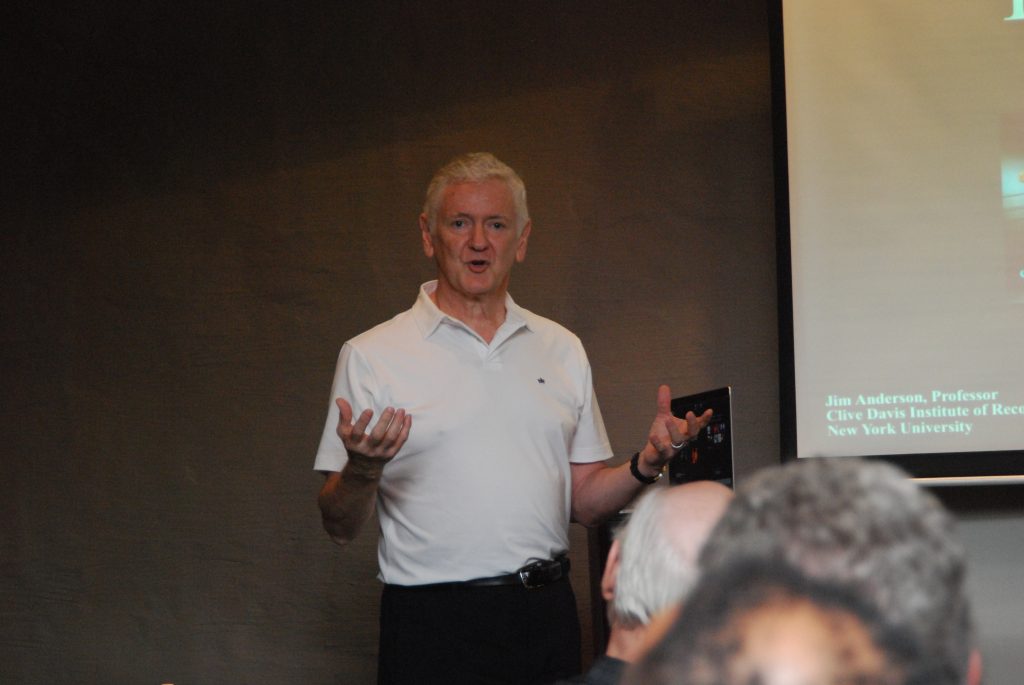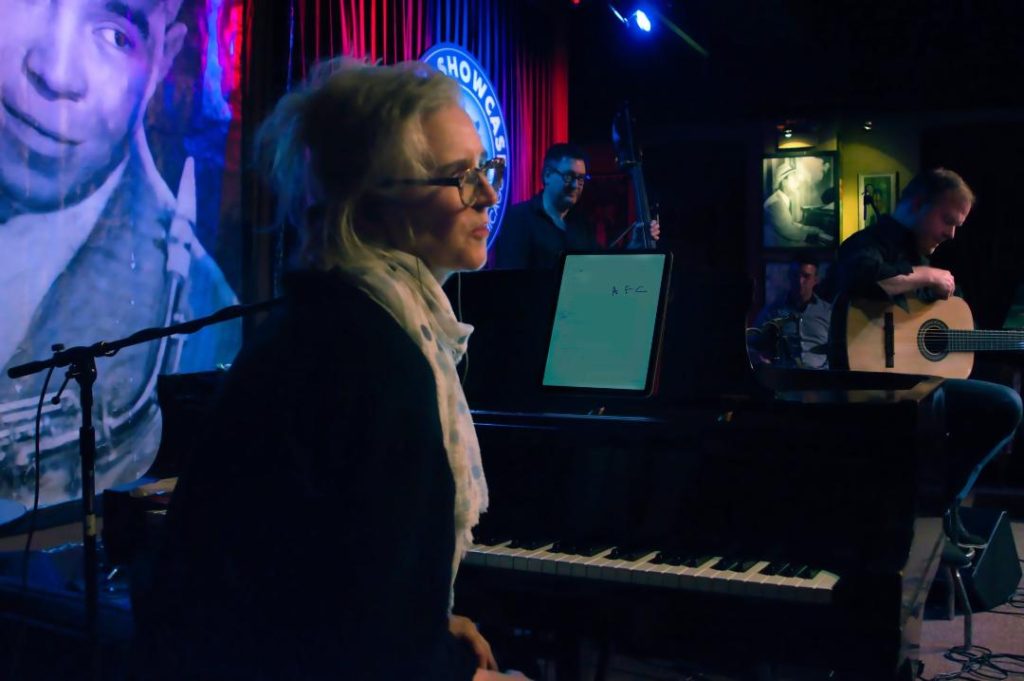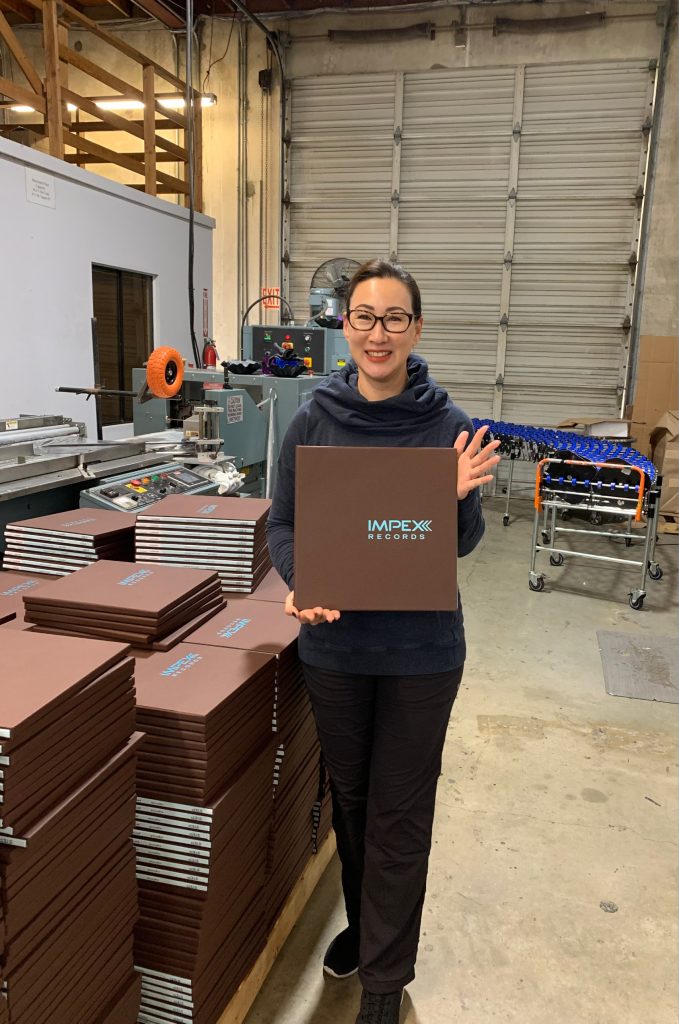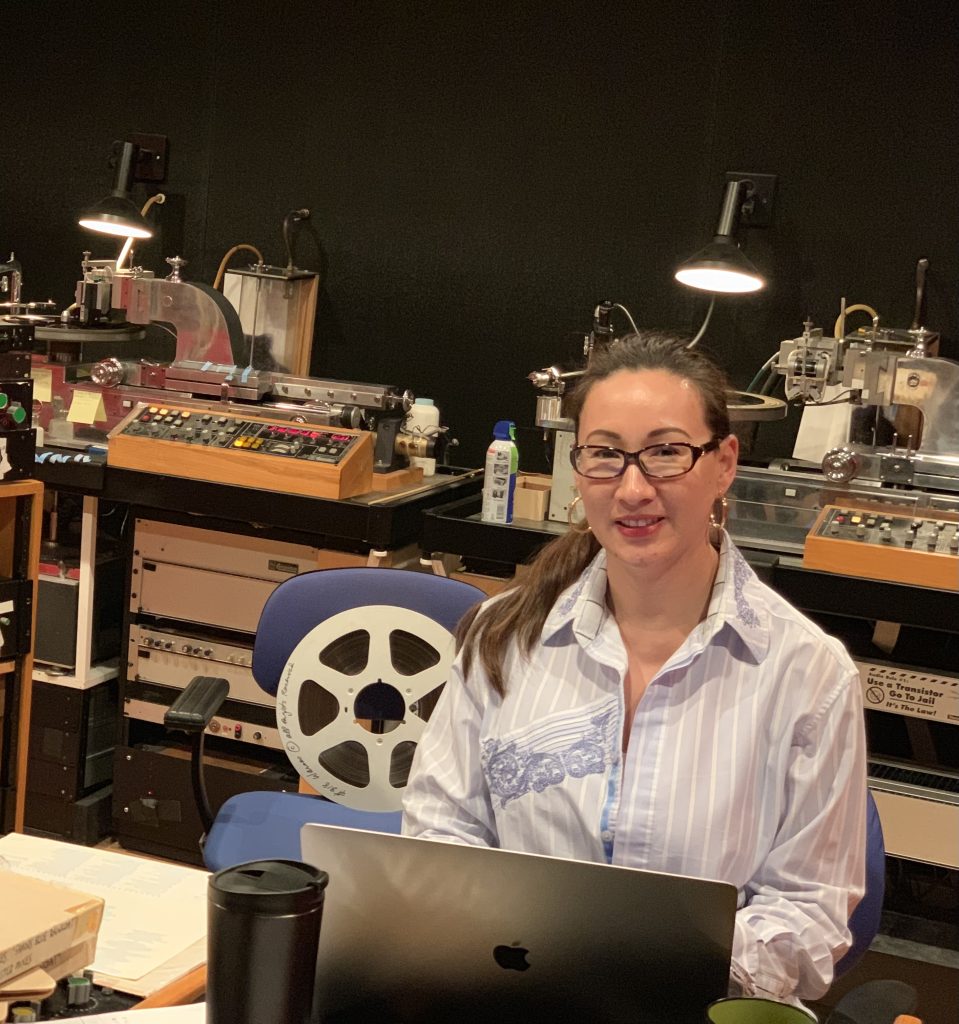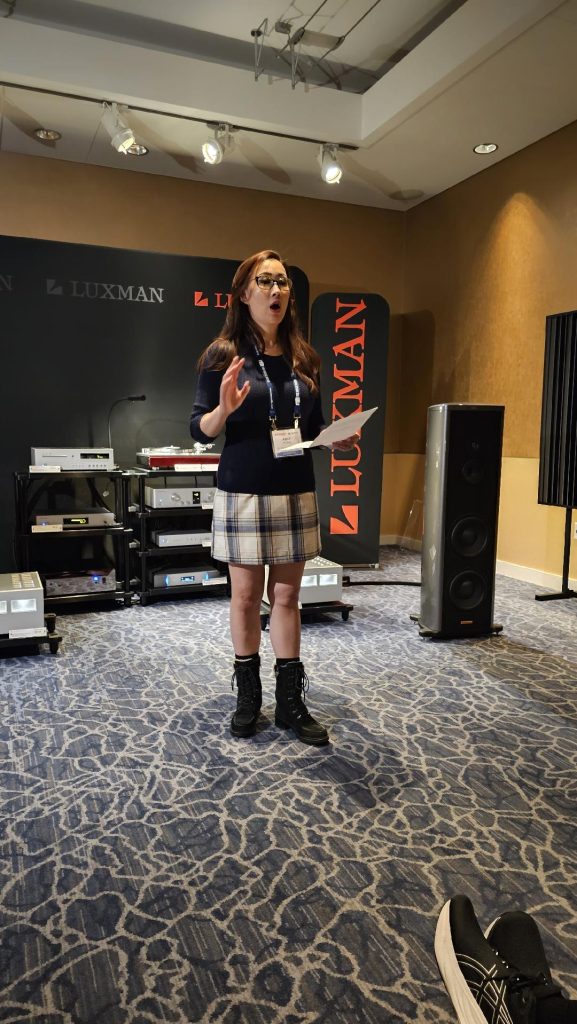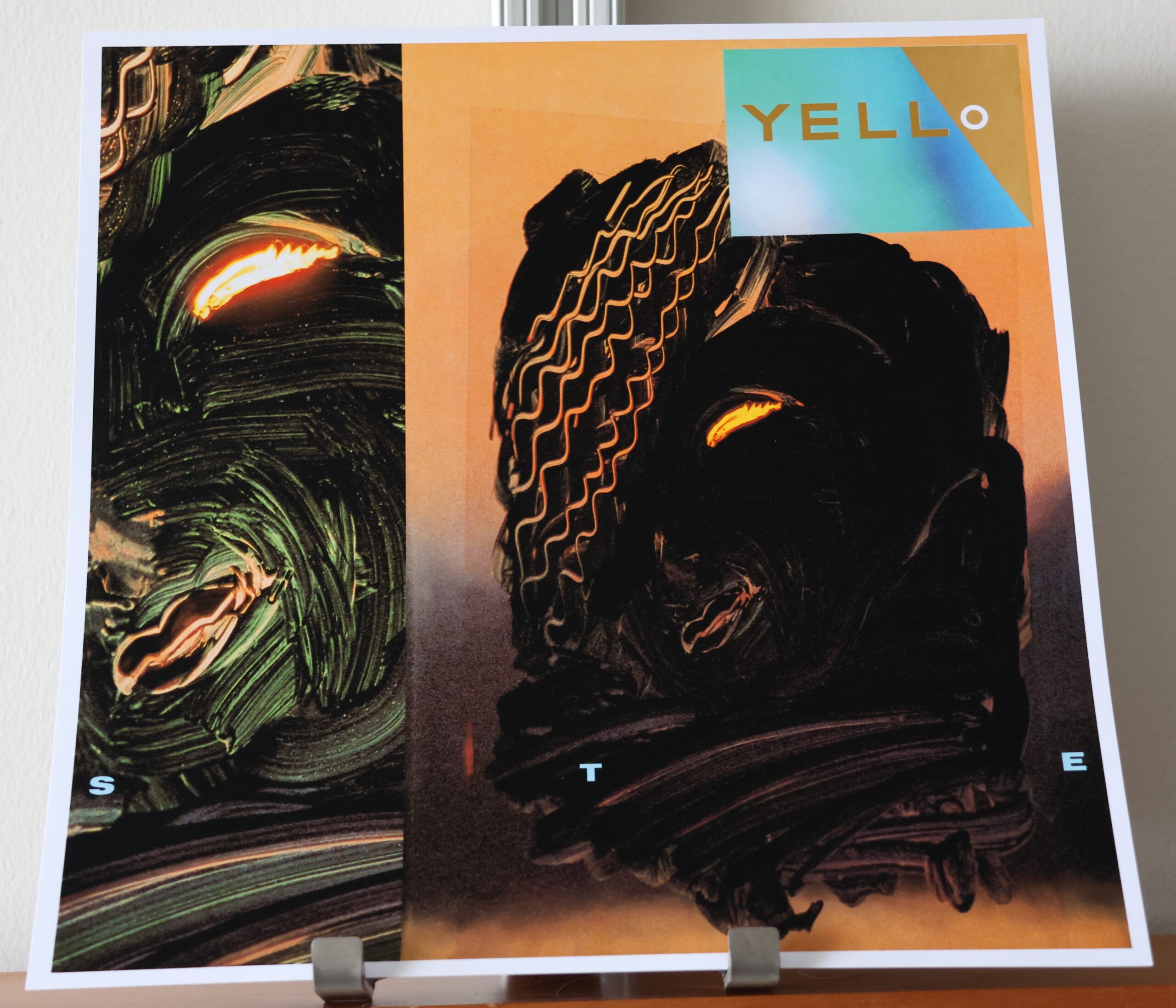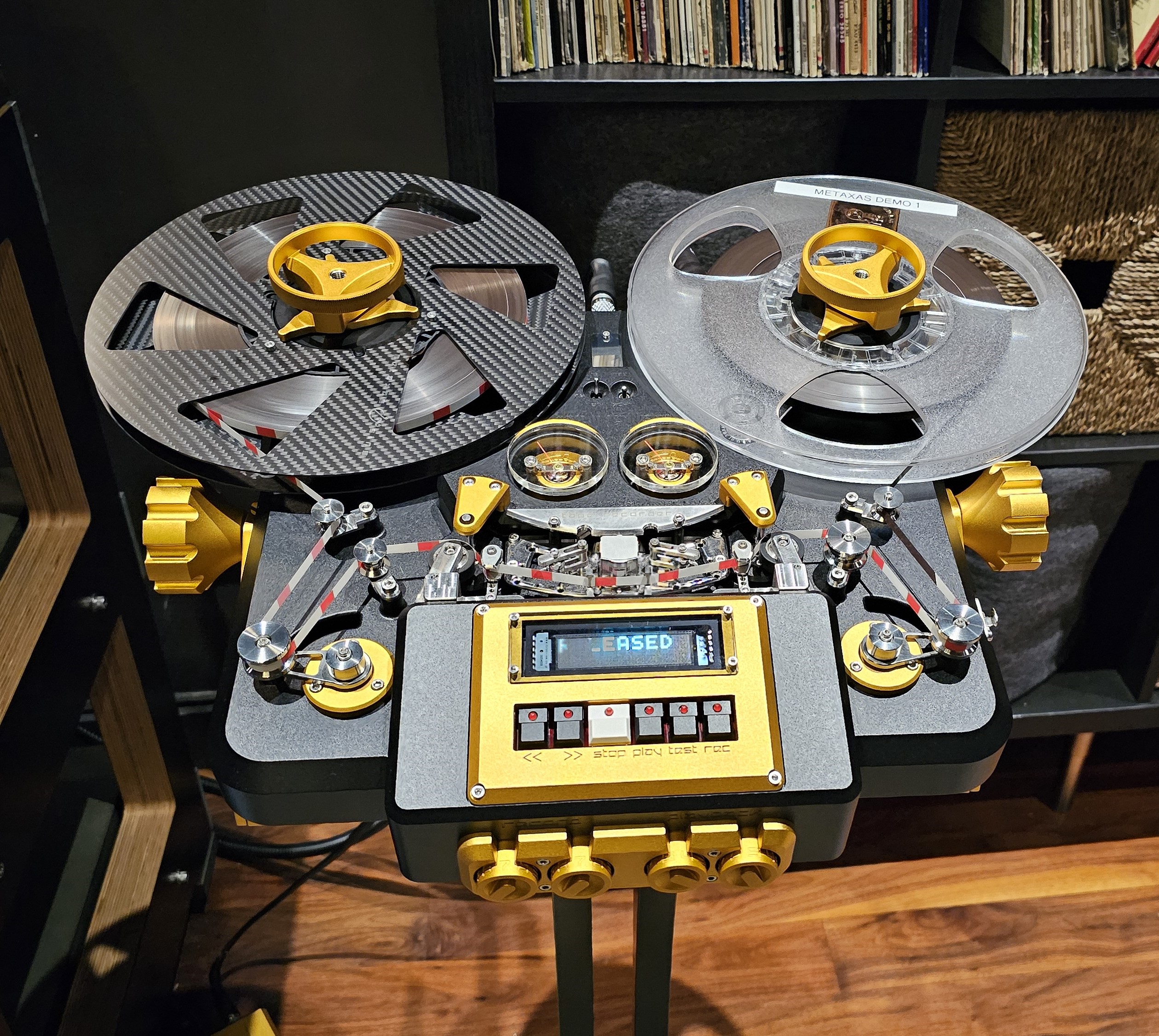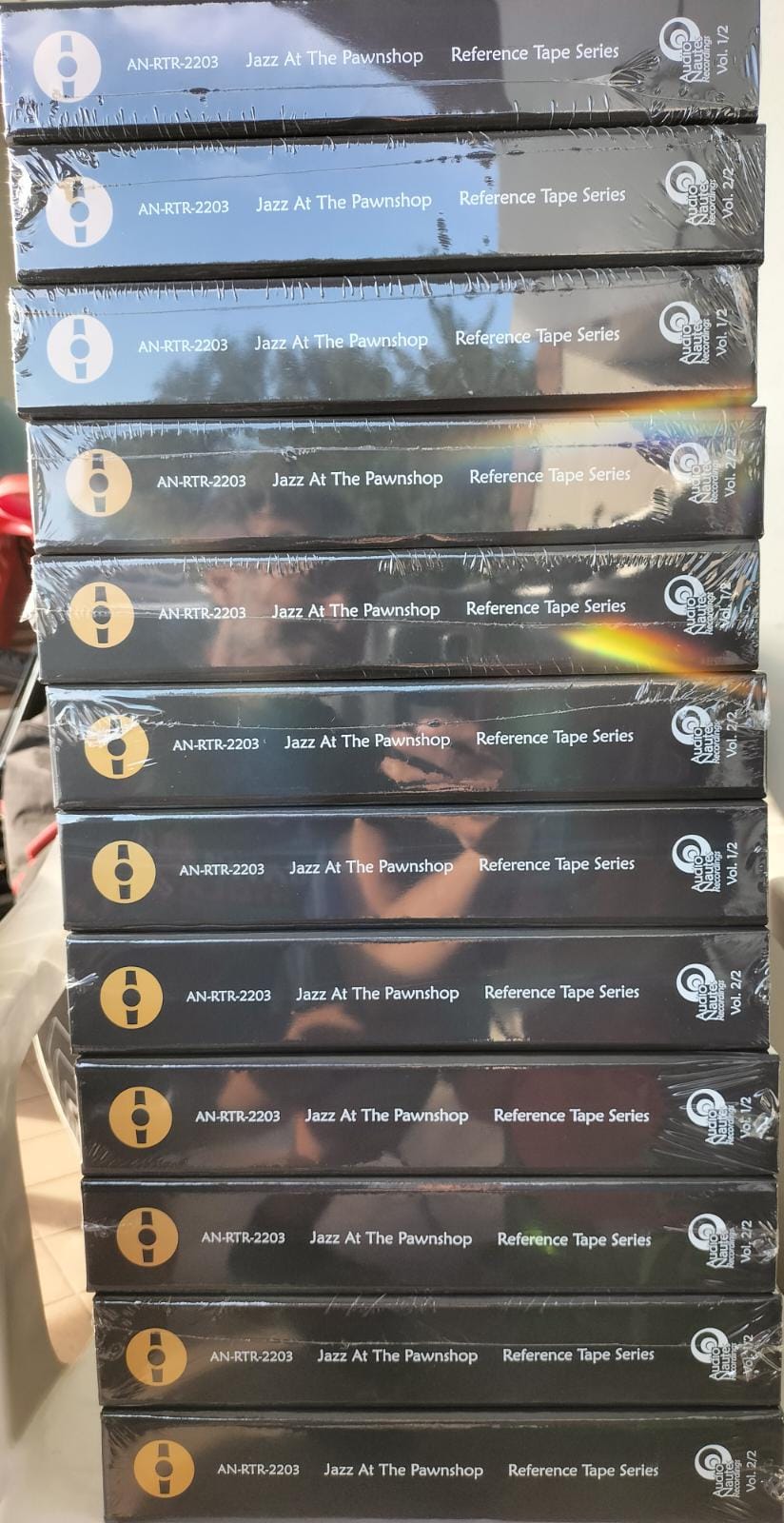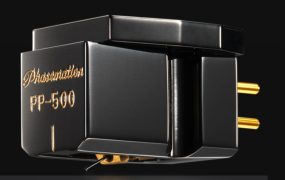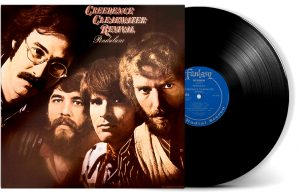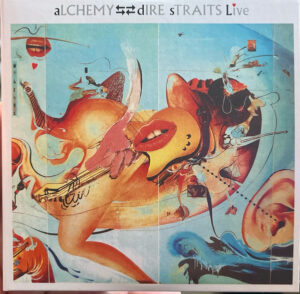Abey Fonn, President of Impex Records, always likes a good challenge. But Impex Records' latest project required Abey to dip deep into her bag of tricks to come up with the ultimate vinyl version of Patricia Barber's Nightclub.
Nightclub was Barber's sixth, not to mention, one of her best-selling albums with sales peaking at 200,000 copies (Café Blue, by comparison, has sold more than 500,000 copies). Barber is more than capably backed on Nightclub by the likes of Michael Aropol (who went onto become one of Barber's long-time collaborators) and Michael Johnson on bass and guitarist Charlie Hunter on 8-string guitar (whom Barber was playing with at the time on the jazz circuit). Hunter's 8-string guitar allows him to simultaneously play the bass line, chords and melodies.
Engineering duties on Nightclub were handled by Jim Anderson using Sony's 3348 multi-track digital DASH (Digital Audio Stationary Head) machine. Early digital studio machines such as the Sony—unlike current machines that use hard drives—recorded onto either ½- or ¼-inch digital tape. Anderson's 3348 fed a Neve analog console from which either an analog tape or digital mixdown master was produced. Reading through the album's liner notes brought me back to an interview I did years ago where Anderson described how he used the stairwells at Chicago Recording Company to produce the reverb found on Barber's early albums.
The Contenders
Discogs.com lists 17 different versions of Nightclub (both vinyl and CD). The first 33-rpm LP version of Nightclub was released on the Premonition Records label in 2000. Discogs.com credits Alan Tucker as the mastering engineer for the Premonition Records release and that appears to be a mistake. Impex Records also lists Scott Hull in the album liner notes as the mastering engineer and that too appears incorrect. At least for my original pressing of Nightclub. My original copy has the initials RJ (Ray Janos)—an engineer with Sterling Sound—scribed in the deadwax.
Mobile Fidelity reissued Nightclub six years later as 2 x 45-rpm Paul Stubblebine remastered box set. That box set was followed seven years later by a 33-rpm version spread out over two LPs/four sides and remastered by the late, great Doug Sax of The Mastering Lab. Jump ahead another six years and Premonition Records in collaboration with Jonathan Horwich of International Phonograph, Inc. released Nightclub for the very first time ever on 15-ips reel-to-reel tape.
The Definitive Pressing of Nightclub?
Finally, Impex Records—who had recently signed Patricia Barber to their label in 2020—took the deep dive into rarified audiophile territory with the release of as Abey Fonn proudly said, "the definitive," audiophile, 1STEP version of Nightclub. Definitive in every sense of the word ranging from the record mastering to the record pressing to the type of vinyl used for record pressing to the record packaging. Abey didn't mess around here either and went to the master Bernie Grundman to master her album. Grundman used the original analog mixdown master to cut the 45-rpm lacquers for Impex Records 1STEP version of Nightclub.
A quick refresher for those unfamiliar with the one-step record pressing process recently repopularized by Mobile Fidelity with their Ultradisc series. In the conventional three-step record pressing process, the lacquer is electroplated to produce a "father." The father is then replated to produce the "mother" that is then replated to make the stamper. One father can produce ten mothers and each mother can make ten stampers. That's a whole lotta records!
By contrast, the recently cut lacquer is electrochemically plated (ideally within 24 hours after cutting the lacquer) to produce a DD1s "convert" stamper (otherwise known in old parlance as the "father") in the one-step record pressing process. This metal part is then used as a stamper to press records and eliminating two steps from the manufacturing process. In other words, the conventional three-step process is, "designed for optimal yield and efficiency" and the newer one-step process for the "ultimate in sound quality."
There are a couple of limitations to the one-step record pressing process. Primary among them here is that a single set of lacquers can only produce around 500-800 records. Four sets of lacquers, at minimum, are required for a pressing run of 2000 records. That's assuming all sets are perfect and that's rarely the case! Not to mention all extra lacquers add significantly to the cost of the final project. (Impex cut 13 sets of lacquers for Nightclub!)
Nightclub was pressed using Impex Record's special VR900-Supreme Neotech vinyl formulation. Among this vinyl's attributes are the ability, "to eliminate the characteristics of materials that increase noise in record grooves" as well as, "incredibly precise groove definition." And the difference between conventional and VR900-Supreme vinyl formulations is clear. Just hold the two LPs up to a light.
Quietness and vinyl formulation is one thing. What isn't widely appreciated, however, is that quietness begins with the lacquers. Some mastering engineers I've spoken with over the years feel that the quality of lacquers has been going down ever since Pyral, inventor of the acetate disc in 1934, ceased operations. Mastering engineers nowadays need to cut several lacquers to get one quiet side. Especially if a given recording has a lot of quiet music and that's the case here on Nightclub.
Lastly, Abey and Impex Records went all out on the packaging of Nightclub! Nightclub comes as a gatefold trifold jacket (can't remember the last time seen a trifold) replete with a slickly produced insert that resides in a beautiful pebble surface slip case. I'd suggest storing your copy of Nightclub in a medium size, outer plastic sleeve to keep that slip case looking like new.
In the end, all these factors contributed to the making of the ultimate version of Nightclub. And as they say the proof is in the listening.
Warming Up
Nightclub is one of my favorite Patricia Barber recordings. On the sonic front because Nightclub isn't drowning and awash in reverb like some of Barber's other recordings. Nightclub is, by contrast, a much simpler recording. The other part is that everyone is going to have different favorites from among the twelve standards on Nightclub. These include the likes of, "Autumn Leaves, Alfie, Summer Samba" and more. Standards being what they are also always leaves plenty of room for interpretation and improvisation. And there's plenty of improvisation going on. Take for instance, "Autumn Leaves." Yes, there's that target note that the musician wants to arrive at but how they get to the destination is a whole 'nuther story (listen to Miles Davis' version for some unique roadmaps.)
The other story here is the replacement of "Santa Claus is Coming to Town" bonus track appearing on the first two vinyl releases and 15-ips tape of Nightclub with the classic "Wild is the Wind." "Wild is the Wind" was composed by Dmitri Tiomkin and Ned Washington for the 1957 film of the same name and originally sung by Johnny Mathis where it reached #22 on hit chart. The most recognizable rendition, however, was performed two years later by Nina Simone and appeared on both her Town Hall and later studio compilation Wild is the Wind albums. More recently David Bowie did a version that appeared on his album in tribute to his newly made friend Nina Simone, too.
Round 1: Premonition Records (First Release) vs. Impex Records 1STEP Pressing
Let's get the easy comparison between the original, 2000 Premonition 33-rpm release, and the new Impex Records reissue Nightclub out of the way first. Here, lies the biggest difference in sound quality among the different analog formats. After this, the differences between the 2013 Doug Sax mastered version, the Impex 1STEP and Premonition 15-ips reel-to-reel tape remasterings shrink rapidly.
To the point: the original Premonition LP is the most digital sounding of the four Nightclub albums. There is a distinct lack of harmonic overtones to Barber's piano. Notes just start and stop. The bass is funky, thick and ill-defined at points. Cymbals have that "early digital hallmark." There is also an increased sense of tension unrelated to the music as well as a loss of dynamics and layering of instruments. There was none of that get up and dance feeling especially on a track such as "Summer Samba." To sum it up: the album sounded boring and plodding against the Impex Records release.
Round 2: Premonition Records/Doug Sax Reissue vs. Impex Records 1STEP Pressing
Skip ahead to the Doug Sax mastering and it's whole 'nuther story and musical experience. Now we're starting to sense the big, expansive sound of Nightclub. Perhaps the biggest difference between the Impex and Premonition/Doug Sax version is traceable to the vinyl itself. That greater sense of quietness and lowering of the noise floor on the 1STEP allows for the unmasking of more music in the grooves. The soundstage on the Impex Records release is also bit more transparent though the Premonition Records pressing is no slouch either.
What are a few of the other differences between the Impex and Doug Sax mastered version? Overall, there's just a little more of everything—as subtle as they might be—on the Impex Records 1STEP reissue. Airiness. Reverb. Musical flow. Dynamics. Openness. Barber's piano is also a smidge brighter and illuminated on the Doug Sax version.
Take "Yesterdays" for example. There's more subtle reverb added to Barber's voice. A greater sense of the piano being in the listening room and air surrounding the instrument. Even a tiny bit more feeling of extension to the cymbals and decay even on this 44/16 digital recording. Topped off by a bit more dynamics.
Or take the opening bass line on "Just for A Thrill" or "Alfie." There's clearly more detail, body and decay on the Impex Records 1STEP. That's coupled with greater sense of transparency and less blurring on piano notes. Subtle details such as the brush strokes on the drums exhibit even greater detail.
Round 3: Impex Records 1STEP Pressing vs. 15-ips Reel-To-Reel Tape
Now for the acid test: the 15-ips reel-to-reel tape and my sonic benchmark for Nightclub vs. the upstart 1STEP reissue. The big difference here relative to Rounds 1 and 2? One needs to listen far more closely for differences between the two formats. Note that the 1STEP has the songs in a different order so running the tape and LP in parallel and switching between the two formats was essentially impossible. Thus, the comparison was just one song against the other.
So arguably the Doug Sax version of Nightclub brought us 70% of the way to musical nirvana leaving a ceiling of opportunity of another 30%. Yes, that pesky law of diminishing returns is always rearing its ugly head. Think of it, however, that it's the last 30% of performance, not first 70%, that is the most musically rewarding. More to the point. This comparison just reinforces just how good a job Bernie Grundman did on the mastering for the 1STEP Impex LP.
The envelope please. And the winner by a nose is reel-to-reel tape. In general, the reel-to-reel tape is just a little more organic and layered. The tape also exhibits a greater sense of dynamic ease, more harmonic overtones, and a touch deeper bass than the 1STEP LP. A little more feeling of the musicians in the room. A little more startle factor on the drums and bass. A little smoother. A little more subtle reverb/decay to Barber's voice. All this creates a more musically involving experience.
"Autumn Leaves" on the reel-to-reel tape really stands out for its authority and explosiveness and the way notes on the bass jump out. The tape also exhibits greater low end control, transparency than the 1STEP LP.
Another example of the differences between the two analog formats is the cut "Jazz Samba." Here the tape sounds just a little less artificial. The piano possesses a richer harmonic palette and a more effortless feel on the reel-to-reel tape.
Lastly, the "Invitation" track really serves to illustrate the tape's slight advantage when it comes to that subtle, low level resolution such as the playing of brushes on the drum head.
Crowning The New Vinyl Champion Pressing of Nightclub
The Impex Records 1STEP clearly deserves its top billing as the definitive version of Nightclub! The Impex 1STEP version fended off both vinyl contenders and only fell a little short when facing off against 15-ips reel-to-reel tape. The tape sounds a bit better but it's four times the cost of the 1STEP LP and more of a niche product. Perhaps the most exciting thing to come out of this all is just how good sounding the 1STEPs are if properly done. In fact, I have a sneaking suspicion that all analog one-step LPs can be even better sounding.
A word to the wise! One-step pressings are produced in small batches and chances are when sold out, they won't be repressed. So buy those one-steps when they're released or chances are you'll be forced to pay the big, sometimes exorbitant prices demanded on eBay and discogs.com.
Stay tuned for more on other AAA analog one-step pressings making the rounds here! Not to scoop myself but these all-analog one-steps are even better sonically and bring us a large step closer to the sound of the master tape!
Technical Information
- Partricia Barber: Nightclub.
- Producer: Patricia Barber, Executive Producer: Michael Friedman, Recording and mixing engineer: Jim Anderson.
- Recorded and mixed at the Chicago Recording Company.
- Recorded Chicago Recording Company, Studio 4, May 16-17 and June 2-3, 2000.
- Originally mastered by Scott Hull/Classic Sound, NYC.
- Impex 1STEP Edition
- Mastering engineer: Bernie Grundman
- 1STEP LP Pressing: RTI, Camarillo, CA.
- Viny: Neotech VR900-Supreme.
Interview with Abey Fonn, President of Impex Records
MBA: So, Abey let's start with what went into Impex's definitive 1STEP (vs the traditional three-step) pressing of Patricia Barber's Nightclub and how it differs from the other releases I've included in the review including the original Premonition Records release, the later 2 x 33-rpm 2013 remastering and the 15-ips tape version. Funny enough, the biggest difference among the trio of LPs was between the original Premonition Nightclub release and your 1STEP release. Even more interesting was that the original release of Nightclub release wasn't all that good sounding. It in fact, it sounded really digital; Doug Sax's remastering was markedly better; then atop the mountain was your 1STEP and Jonathan Horwich's 15-ips tape dub.
AF: I was thinking there was one other release.
Yes, there is.
I think there was the Premonition and then the Mobile Fidelity.
Yes, the MOFI 2 x 45 rpm box set remastered by Paul Stubblebine is the only version that I'm missing (the price of the MOFI version on Discogs precluded me from buying a copy for this article). In fact, I remember Mobile Fidelity releasing Patricia's other recordings on vinyl but I have no, zero recollection of Mobile Fidelity releasing Nightclub back in 2006 (Discogs lists the MOFI release date as 2000 but that is wrong.)
So it must have been quite a daunting task taking a great sounding audiophile favorite and wondering how can I make it even better? Because, well, you know how picky audiophiles can be. What were you thinking in the process of putting this whole project together?
It kind of started as a combo discussion when we were talking about the 1STEP release; I was talking to Patricia's team and legal team about doing Higher and Clique!. At the same time was also talking to Mike about our interest in doing the 1STEPs (Mike Friedman at Premonition Records). I said these albums are great and they've already been out in multiple formats. I wanted to see if I can take it (Nightclub) to the next level by giving it the Impex treatment. Talking about assets I would be working with and the costs I'd like to do the four famous audiophile darlings Companion, Modern Cool, Café Blue and Nightclub and at the same time work on the Higher and Clique! newer releases. Which was much more work putting out a new album.
You signed Patricia Barber to your label in 2020?
Yes, right at the beginning of Covid.
Congratulations! What did you envision your relationship would be with Patricia? Reissuing her older material and also new recordings?
Older materials we licensed from Premonition. We worked with Mike and he provided art, the master tape, etc. I told him even though we have some digital titles, Impex is pretty committed to analog sources. I worked with Patricia directly on Higher and Clique.
It's nice to hear that Mike was cooperative.
Yes, he was helpful. But like any negotiation, you have your hiccups, little elbow beating, but at the end we worked out a great arrangement and got along great! He provided a lot of insight. I had access to a finished master tape with Café Blue. It was a little more daunting with Nightclub because even though he gave me masters, they were all working masters. Bernie had to carefully reassemble the reels and we had to go back to the beginning.
Do you find that there were a couple of dropouts on the master tape?
Yes.
OK, so I wasn't imagining that. I asked a couple of friends in the recording industry was it possible to have dropout on digital tape and they were more like it's just a miracle that the digital tape lasted this long. So that was another issue Bernie had to work on.
Yes, to fix.
So Bernie spun his magic and assembled the tapes. Then the next step was getting the lacquers off to RTI?
He did his mastering magic. We cut several test lacquers and compared them to the reference we had on hand, both Premonition CDs and LPs. We wanted to capture the magic as though you are there. There were parts of the album we wanted to have more air. I think Bernie did a great job.
BA: The first Nightclub that Premonition released was boring sounding. It lacked life. It lacked harmonic overtones. When Doug redid Nightclub, all of a sudden the Latin tunes like "Soul Samba" made you want to get up and dance. Hmmm…what going on, my feet are nailed to the ground.
So this wasn't obviously your first 1STEP. I can't remember if it was your second or your third?
It was our second.
So what did you learn from doing the Café Blue 1STEP that you were able carry over to the Nightclub project 1STEP release?
Cut more lacquers! (laughter) All at one time. Because financially it's expensive to cut a lot of lacquers at one time and so we were kinda cutting them as we need them. Remember, too, this was also done during Covid so our normal process wasn't normal! Everything that we would normally do…. there was a monkey wrench thrown in it. And Bernie's system was also in the midst of some minor tweaking and upgrades; we were realizing that if you cut with a ruby stylus, a diamond stylus, it changes the sound. So, when we finally found what we love and captured the essence of what we were looking for—you better cut as many lacquers as you can. We cut a total of thirteen sets of lacquers…
Wow, that's costly.
So costly. And not just costly but time consuming. And we Q/C test pressings from every lacquer. So yes, Bob Donnelly, who does it all, he's our Q/C Director and sometimes plays the role of producer, etc. he listened to all 13 sets of test pressings.
Yes, been there and done that for friends. It's not fun. You're not listening to the music, you are just listening for defects or flaws.
Right. Well, you're sitting there with a timer, you're critically listening, 13 sets of lacquers to find the ones that we wanted. Even with that, there's no guarantee. That's why I asked, did you get a good pressing. Sometimes there's no guarantee even if the lacquers were good.
Out of the 13 lacquers, you many did you use? How many were good and how many did you end up using? You were planning to press a run of 2000 LPs?
We were trying to press 4000 LPs as the initial press. We already went through seven sets of lacquers, and scrapped four full sets.
How many LPs do you get from one lacquer using the 1STEP process?
Close to 1000 now. Café Blue was around 500 or 600. Now we're getting around 800. We haven't hit 1000 but we're getting there.
What is the biggest problem that you're running into now with the 1STEP process?
Time. Are you talking about Nightclub or just in general?
In terms of Nightclub. What parts of the 1STEP pressing process are you still working out?
Actually, the process for Night Club is going well. We were able to create all the lacquers we needed for this release. So, we're in good shape for our repress. I'm confident audiophiles will love this definitive version.
Yes. Did I read correctly that Nightclub sold around 200,000 copies? I was gobsmacked.
Yes, I think Café Blue pretty much doubled that. It may be a combo of all the formats licensed and digitally released. Mike had some home runners. (laughter)
So much for audiophile records not selling.
Another wonderful Impex female performer that has had longevity is Jennifer Warnes. I was joking with a friend of mine that the word "Blue" is magic. Café Blue. Famous Blue. Joni Mitchell Blue. All the blues did pretty well. Kind of Blue.
Yes, that's funny! Great, so the next thing is you went with a different bonus track on the 1STEP of Nightclub than on the earlier versions of the album. "Santa Claus Is Coming to Town" was the bonus track on both the Stubblebine and Doug Sax mastered LPs in addition to the Jonathan Horwich dubbed 15-ips reel-to-reel tape version of Nightclub. You (Impex) and Patricia instead went with the song "Wild is the Wind." What's the inside story behind your retiring old Saint Nick?
That was actually a surprise. So, we were listening to the tapes and this was one of the songs on the tape. I was like wait a second, that doesn't sound familiar. So, I brought this up to Mike and he kinda had this hmmmm…. We then realized the song was part of original recording and Patricia wasn't fond of it at that time. And she decided she preferred "Santa Claus is Coming To Town." I personally think "Wild is the Wind" is one of the best tracks on the album. It really was a pleasant surprise. So I went back to Mike and Patricia and we had to send her a sample to listen to again. We went back and forth, and Patricia said she, "forgot how good it was!" Mike helped get Patricia's approval for "Wild is the Wind" to be used on our special edition as the bonus track.
I also found it was more fitting and as you said, "Santa Claus is Coming to Town" was cute but found "Wild is the Wind" is more fitting. Both songs were recorded at the same time. It wasn't like I was pulling "Wild is the Wind" from a different decade.
It was just kind of funny. You're thinking standards, Xmas music, kind of brought a smile to my face.
So is there anything else that you want to add.
You asked me about the one-step process, and what I took away from it. This type of project is truly a labor of love. The 1STEP process is much more finnicky than the process for creating a traditional 3-step. It requires a level of detail and commitment from all of the professionals involved in the process. From mastering, to cutting the lacquers to pressing the vinyl. Even the type of vinyl we use has to match this unique process. For the team at Impex, it's about creating a record that's quiet and has a dynamic, engaging you are there feeling. Our goal is to bring the listener that much closer to the music. To the sound the artists intended. That's why I say it's a labor of love. We know the traditional 3-step process inside-and-out. But 1STEP is unique. And it certainly keeps you on your toes!
The other thing that audiophiles don't appreciate is that some of the music on Nightclub (or other recordings) is super quiet. That lacquer better be super quiet, too. Some audiophiles don't realize that even the Q/C on lacquers isn't what it used to be, probably hasn't been for 30 or 40 years and so you might have to cut a couple of lacquers to get one good one.
Bob's process is to QC all the test pressings for quality consistency. I am the second pair of ears and I listen to one or two test pressings from each lacquer. If I find there's a problem on the first test pressing, I'll listen to a few more for problem consistency. And if the ticks, pops or surface noise are consistent, we know we need to scrap the metal parts and cut new lacquers. Especially when a song is quiet, there's no room to hide anything.
And there are a lot of quiet tracks on Nightclub too! It's like listening to classical music with solo piano. That why people like digital. There's no noise. But as the late Harry Pearson, owner and publisher of The Absolute Sound once wrote, "the absence of noise is not the presence of music."
If people want absolute silence, well, perhaps digital is a better fit …we are trying to perfect an imperfect science.
But it has been a great experience, and Impex will have a few more 1STEPs releases coming out in 2023 and 2024.
Could you give our readers a glimpse into what other projects Impex is working on?
The next Patricia Barber 1STEP release will be Companion and the other secret is—that won't be so secret after AXPONA 2023—we're going to be doing Getz/Gilberto on 1STEP. (Getz/Gilberto is one of only two times a jazz album—the other being Herbie Hancock's River: The Joni Letters—won a Grammy award. Getz/Gilberto also garnered awards for Best Jazz Instrumental Album, Individual or Group and Best Engineered Recording—Non-Classical in 1965. "The Girl from Ipanema" also won Record of the Year. Getz/Gilberto was also the first non-American album to win a Grammy.—MBA)
Yes, I posted something about your upcoming demonstration at AXPONA 2023 on my Audionirvana.org bulletin board in the don't miss in the sneak peaks thread.
I originally wanted to keep it quiet but it's been in the works for quite some time. Getz/Gilberto has been reissued according to Discogs.com hundreds of times. It's crazy. But we're doing something special. The Impex reissue will be the only reissue that is in collaboration with the family, the estate, with their input and support. We have a lot of goodies in the packaging. If you're buying it for the hundreth time, we want to make sure the Impex version is the definitive version you enjoy showing off. So cool having Nicolaus (Getz); attending AXPONA with me this year. He's only going to be there for two days but it's great having his support.
Getting back to the pricing. I was surprised so cheap. You look at the packaging, the slipcase, the quality, none of that is mass produced.
We strive to give our customers great value for their investment in an Impex release. There's so much that goes into re-issuing an Impex 1STEP and we do not cut corners and do things over and over, over and over, until we achieve our vision. We attend every mastering session, every press check. We'll pull random sheets from print press to make sure there is consistency, especially with Saturday Night in SF. We're a very proactive label. Probably the only place we're not there is when record labels are being printed. Do you have a copy of Friday Night in SF?
Yes.
The 45-rpm.
Yes.
That's all hand drawn. That's not cut and paste from a photograph. Impex does not put out the volume. We are more of a boutique label and every title is hand curated. Every title is like giving birth to a new baby.
What was Patricia's reaction to the 1STEP of Nightclub? I know a lot of these albums get put out without any input from the artists. I assume Patricia had some input and what was her reaction?
She had some input. Some artists are very engaging, while others are not. She trusts me, I earned her respect, Patricia viewed parts of the artwork and the final design was sent to Mike for approval to make sure the legal lines were correct and I didn't take the original and destroy it. Patricia was really impressed. There's were a lot of emails exchanged with wows and happy faces.
That's great. People sometimes get burned in the past and then become gun shy. It's great you guys have a great working relationship.
We've had great working relationships with all the artists we work with! These projects are based on trust and if you don't trust me or like what I've done… then I might not be the right label for you. And if you want to micromanage me like I'm 12 then I'm definitely not the label for you. We believe in a working partnership. I get their inputs, find out what's important to them, what they don't like and respect while we are designing. I believe we do great work because I've worked with the same team, Robert Donnelly for 16 years and Robert Sliger for 23 years, so we are a wonderful working family who understand each other's process and our visions are aligned.
I'm currently working on a project where the reference lacquer has more dynamics than the test pressings. We are investigating the issue.
Yes, I've heard that too back in the late '80s when Chesky Records were remastering the RCA Living Stereos and David would give me a reject lacquer that could I play that on my system. The lacquer has a whole 'nuther sound especially tonally.
My goal is to produce records that are as close to the master tapes and reference lacquers as possible. Even if we do everything right, there is still something that can be missing.
Well, thank you so much for your time Abey! Hopefully this article gives our readers a little more insight into what goes on behind the scenes with the remastering and production of their favorite LPs. Especially how Impex Records is taking these cherished and treasured recordings and pushing the limits of the record production process to get everything that's on the tape onto the lacquer and from the lacquer to the LP. That takes attention to the smallest details, things that shouldn't matter but do. From the tape transfer process to the making of the lacquer, to the 1STEP process to the type and quality of the vinyl used in record pressing.





